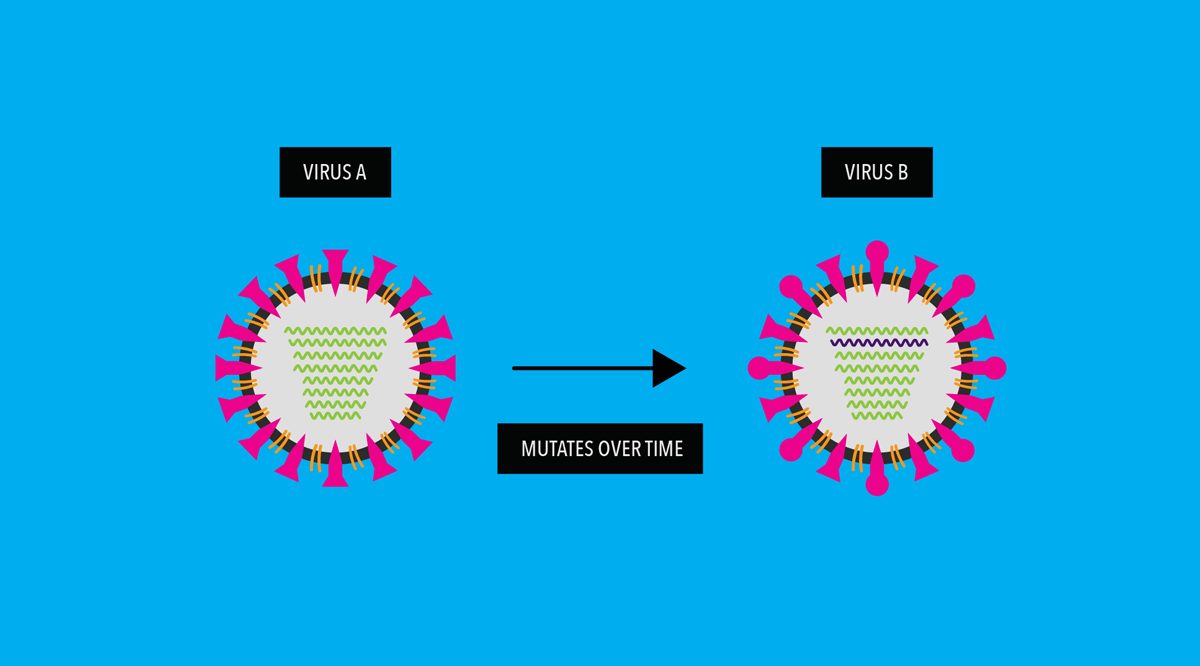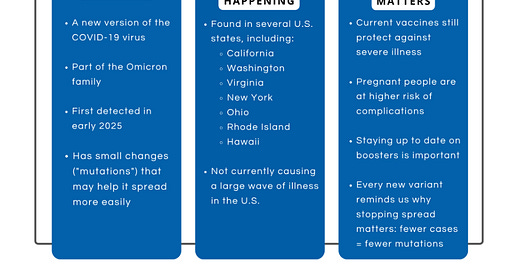In this edition, we break down what’s known about the new COVID variant, what it means for pregnant patients, and explore how and why viruses like COVID-19 continue to mutate.
What Is the New COVID-19 Variant NB.1.8.1?
There’s a new COVID-19 variant making headlines called NB.1.8.1. It’s a version of the virus that causes COVID-19 and is part of the same "family" as the Omicron variant. Cases have been reported in several parts of the world, including the United States, since early 2025. The most common symptoms being reported from this new COVID-19 variant are a severe sore throat, light cough, muscle aches, fever, and congestion.
NB.1.8.1 has some changes in its spike protein—the part of the virus that helps it infect our cells. These changes may help it spread a little more easily. That’s why health organizations like the World Health Organization (WHO) are keeping a close eye on it. Currently, there is no data to suggest that it causes more severe disease than previous variants.
Where Is This Variant in the U.S.?
So far, NB.1.8.1 has been found in states including California, Washington, Virginia, New York, Ohio, Rhode Island, and Hawaii. But it’s likely more widespread than that—testing has slowed down, so we may not be catching every case.
Although the variant is spreading in some areas, it’s not currently causing a big wave of illness. Health experts are watching it carefully but haven’t raised any major alarms.
Does the Current COVID-19 Vaccine Still Work?
Yes—the vaccine still helps. While this new variant has a few differences, the COVID-19 vaccines are still expected to protect you from getting very sick, ending up in the hospital, or dying from it.
Early studies show that the immune response may be weaker against NB.1.8.1 than with some older variants, but the vaccines still provide strong protection—especially if you’re up to date on your boosters.
That said, vaccine recommendations in the U.S. recently changed. Now, most healthy adults under 65 aren’t routinely offered boosters. This has raised some concerns, especially for people who are pregnant or have other health concerns.
Is There Anything Pregnant People Should Know?
Yes—pregnancy increases the risk of getting seriously ill from COVID-19, and new research suggests that even getting infected early in pregnancy may raise the risk of miscarriage.
One study found that people who got COVID-19 before or during pregnancy were 2–3 times more likely to miscarry before 20 weeks. There are also known risks of preterm birth and stillbirth linked to COVID-19 infections later in pregnancy.
Although the vaccine is safe and effective during pregnancy, the CDC has recently removed its official recommendation to receive the COVID-19 vaccine while pregnant. Many doctors and public health groups are pushing back because we know the vaccine helps protect both the pregnant person and their baby. The scientific evidence supporting the benefits of COVID-19 vaccination has not changed.
If you're pregnant or planning to become pregnant, it’s a good idea to discuss vaccination or booster options with your doctor.
https://medicine.yale.edu/news-article/covid-19-vaccines-not-linked-to-miscarriage/ DOI: 10.1097/AOG.0000000000005904
So, Why Do These COVID-19 Variants Keep Popping Up?

Here’s a little science.
Viruses like SARS-CoV-2 (the virus that causes COVID) make lots of copies of themselves when they infect people. Sometimes, they make tiny mistakes in the copying process—like typos in a recipe that we call mutations. Most of the time, those “typos” or mutations don’t result in a lot of change. But once in a while, a mutation gives the virus a new ability, like spreading more easily or dodging parts of our immune response that help to keep the virus in check.
That’s how we get new variants.
The more the virus spreads, the more chances it has to change. That’s why keeping up with vaccines and staying home when you’re sick can help stop the virus from multiplying and mutating.
Until next time - wash your hands, cover your cough, and enjoy the nice weather!










Thank you.